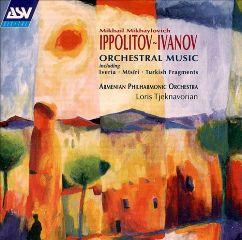Mikhail Ippolitov-Ivanov - Orchestral Music (2001)
Mikhail Ippolitov-Ivanov - Orchestral Music (2001)

1 Jubilee March, Op. 67 5:56 Caucasian Sketches, suite No 2, for orchestra, Op 42 'Iveriya' 2 Introduction: Lamentation Of The Princess Ketevana 7:37 3 Berceuse 3:30 4 Lezghinka Dance 4:19 5 Georgian March 5:08 6 Mtsďri (Lermontov), for orchestra, Op. 54 19:45 7 Armenian Rhapsody on National Themes, Op 48 6:55 8 Asya, opera, Op. 30: I Wonder if it is Misfortune 4:04 9 Turkish March for orchestra, Op 55] 4:20 Turkish Fragments for orchestra, Op 62 10 Die Karawane (The Caravan) 4:10 11 Während Der Rast (During The Rest) 4:40 12 In Der Nacht (In The Night) 3:56 13 Auf Dem Feste (at The Festival) 2:41 Hasmik Hatsagortsian - soprano Vardouhi Khachatrian - mezzo-soprano Armenian Philharmonic Orchestra Loris Tjeknavorian – conductor
Mikhail Mikhaylovich Ippolitov-Ivanov (1859-1935) was a masterful purveyor of the musical picture-postcard. In this, he had much in common with his composition teacher, Rimsky-Korsakov. Like his mentor, Ivanov (he later added the "Ippolitov" to distinguish himself from a slightly older colleague with the same name) was a traveler. After leaving the St. Petersburg Conservatory, he took a post in the Caucasus. It was here that he was inspired to write his two sets of Caucasian Sketches, The first ends with "Procession of the Sardar," undoubtedly the composer's most famous work (and not included here). The second set is capped by a "Georgian March" which is hardly less catchy, although it is far more obscure. (The only thing wrong with it, perhaps, is its similarity to the theme from "Hogan's Heroes.")
The Armenian Rhapsody is based on authentic folk material collected by the Turkish-Armenian composer and ethnomusicologist Komitas Vardapet. Ippolitov-Ivanov makes atmospheric use of a solo violin in this seven-minute work, which is less flashy than some of his other ethnic extravaganzas.
The Turkish March and Turkish Fragments come from 1929 and 1930, respectively. Like the Caucasian Sketches, both seem to have been written to appeal to a broad audience. For music written at that time, it is very old-fashioned, but there's no denying that an expert melodist and orchestrator are at work here. Rimsky-Korsakov might have been a little jealous! The Turkish Fragments could achieve the popularity of "Procession of the Sardar" too, if given a chance.
(Perhaps now is a good time to mention that Ippolitov-Ivanov seemed to weather the Communist Revolution just fine. He ensured his welcome in the new regime with occasional pieces such as the Jubilee March named after Clement Voroshilov, a Ukrainian who modernized the Red Army. The march, which opens this CD, is jollier than one might expect for a display of military might.)
Mtsïri is the longest work on this CD. It is 20-minute tone poem that tells the story of a young lay brother who escapes his monastery and becomes lost in the forest. He meets a maiden and falls in love, and then is wounded by a tiger. He drags himself to a stream in hopes of reviving himself, but dies as he tells his story to a sympathetic monk. All this and more are depicted in the music, which is almost Lisztian. (Again, note that this work was composed as late as 1922.) Mtsïri reaches an emotional climax with a soprano solo – the song of a little fish who lives in the stream. The work has its longueurs, but it is worth waiting around for this inexpressibly limpid and lovely solo.
This CD also includes an aria from Assya, Ippolitov-Ivanov's third opera. I am astonished that this aria hasn't found its way to the West in more recordings. There's no doubt about it: Ippolitov-Ivanov wrote masterfully for the voice too.
Tjeknavorian's conducting, as always, has plenty of spirit and color. He is always more than dependable in this repertoire. Although his orchestra isn't the most refined and sumptuous, they play with character. "Character" also describes the voices of Khachatrian and Hatsagortsian. The latter has a wide vibrato that threatens to puncture the composer's pure-white vocal line, yet the sincerity of her singing (and Khachatrian's) is moving. Yes, I wish a first-class orchestra would record this music. Nevertheless, I can't help but be happy with Tjeknavorian and his happy Armenian band. The engineering, as is usual from this source, is excellent, and so are the booklet notes by Robert Matthew-Walker. --- classical.net
download: uploaded anonfiles mega 4shared mixturecloud yandex mediafire ziddu








